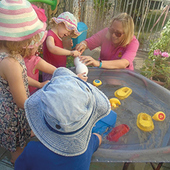
For Good and Outstanding nurseries, the availability of training for staff depends on where they are situated. This means these nurseries, which councils have no legal obligation to support, are now dependent on whether the local authorities’ head of service regards the early years as important.
Beatrice Merrick, chief executive of Early Education, says this ‘postcode lottery’ has ‘hugely different models operating’. While some local authorities still provide free or subsidised courses, others charge the full cost or are outsourcing to companies.
‘Our greatest concern is about the inconsistency,’ she says. ‘Providers have no guarantee that high-quality, reasonably priced training will be available in their area. As with any market, that tends to disadvantage the most vulnerable. We already know that the quality of PVI provision in disadvantaged areas is lower than in better-off areas, and those settings are least likely to be able to access and pay for the kind of CPD which would raise their standards. If they are barely scraping a Good Ofsted rating, they do not have a right to local authority training and support to help them improve further.’
This has all come as a ‘shock’ to the sector, believes Sue Overton of Soap Media, who writes and produces films to facilitate training. ‘We have had 20 years of developing a cultural expectation of having our hand held when it comes to training,’ she says.
Has it also come as a shock to local authorities? Ms Overton says some are more organised than others, with the best setting up a variety of different models: varying from clubs offering subsidies and discounted training to members, to cost recovery and profit-making, and a mixture of the two. One local authority, Kent, is in discussions with the Department for Education about selling its programme of training to other local authorities, while it also invites providers in other counties to buy its courses (see overleaf). A profit-making venture, Smart Solutions, has been set up by North Yorkshire County Council, offering ‘nearly 30 different business functions ranging from catering and cleaning to HR advice and legal support’ and early years courses at a ‘competitive price’.
Should we be sceptical of profit-making where these services used to be free? Ms Overton says not necessarily. ‘There is nothing wrong with making sure there is some charge in order to make a service sustainable. It means the service won’t disappear overnight. It also means, if it is commercial, they have to get it right and make it something cash-strapped nurseries see the benefit of investing in.’
Though it’s difficult for settings to feel like they are getting a good deal when paying for something which used to be free, there are sources of revenue available. Some providers are now using the Early Years Pupil Premium to fund staff training. Research has shown that the money is often better spent raising quality – which, after all, has to be high for any intervention to be effective – than on any single project. Ms Merrick also suggests settings clubbing together to share training, but warns that this requires ‘settings building trust and getting over the idea of being competitors’.
TRAFFORD COUNCIL
Trafford runs a ‘club’ model with individual local practitioners paying an annual membership fee of £20. This gives them access to a suite of 14 e-learning courses such as early help, risk assessments, food safety, information sharing and safeguarding against radicalisation. Members can also access a wide range of face-to-face courses such as paediatric first aid, safeguarding, British values, phonics and active play. For each face-to-face course there is an additional charge, ranging from £20 to £45 per practitioner, with the exception of the free Level 1 Safeguarding Children course.
Early years commissioning manager Sarah Butters says, ‘We consulted with the early years sector and established that providers valued the quality training opportunities which were offered by the local authority. Market research surveys helped us identify demand and what providers would be willing to pay. This model was most popular and financially viable.’
She doesn’t think the quality of local provision has been affected by practitioners having to pay for training, with 94 per cent of early education providers in Trafford being judged Good or Outstanding by Ofsted.
Lisa Oakley, manager of Little Oaks Nursery in Partington, Greater Manchester, is happy with the membership package and has signed up all 15 staff members. ‘They do courses online in quiet times at work or in their own time, but some courses I prefer to pay extra for face-to-face training. It’s good to share information, have questions answered and hear other people’s experiences,’ she says. ‘We used to get a lot for free but I understand times have changed. Many three-hour courses cost us £20, which is still very good value, and staff bring real, relevant knowledge back to the nursery to share.’
KENT COUNTY COUNCIL
 A new training model called Threads of Success has recently been launched in Kent. The model includes a range of both paid-for and centrally funded services and products, delivered through a framework with 19 ‘threads’. The idea is that providers work together in established collaborative partnerships. Partnership and integration manager Sandi Mortimer says this way of working allows settings to share good practice and support each other while also accessing reduced-cost training.
A new training model called Threads of Success has recently been launched in Kent. The model includes a range of both paid-for and centrally funded services and products, delivered through a framework with 19 ‘threads’. The idea is that providers work together in established collaborative partnerships. Partnership and integration manager Sandi Mortimer says this way of working allows settings to share good practice and support each other while also accessing reduced-cost training.
‘Collaboration leaders’ can access centrally funded CPD opportunities to support them to further develop their collaborations. Settings can choose whether to attend an event as an individual on a scheduled course, or to opt for in-house training. Settings with Good and Outstanding Ofsted judgments continue to receive free support through Annual Conversation visits.
Ms Mortimer says it is one of the few local authorities to offer a range of core training completely free of charge, including business support courses, enhancing family involvement in children’s learning training and SEND visits.
‘Evaluation of our specific services and products within this new flexible offer suggests that providers on the whole find the services to be of outstanding quality,’ says Ms Mortimer. ‘Some providers expressed disappointment that they are required to pay for services, but most appear to understand the position of the local authority and have remained positive about the changes.’
 Debbie Gunn, manager and owner of D-Dee’s Day Nursery in Faversham, Kent, finds the new course prices reasonable and likes the new website. ‘We’ve been lucky as a sector to have had free training for so long. It’s now money that we’ll have to find but there are still some centrally funded courses. We used to have visits once a term but now only have an Annual Conversation visit, which we had recently. It was free and really useful - good to know we’re interpreting policy correctly,’ she says. ‘We’ve never done training for training’s sake and will continue to pay for training according to the individual needs of children or staff interest.’
Debbie Gunn, manager and owner of D-Dee’s Day Nursery in Faversham, Kent, finds the new course prices reasonable and likes the new website. ‘We’ve been lucky as a sector to have had free training for so long. It’s now money that we’ll have to find but there are still some centrally funded courses. We used to have visits once a term but now only have an Annual Conversation visit, which we had recently. It was free and really useful - good to know we’re interpreting policy correctly,’ she says. ‘We’ve never done training for training’s sake and will continue to pay for training according to the individual needs of children or staff interest.’
Kent is currently developing a programme to sell to other local authorities wishing to develop this collaborative model and is in early discussions with the DfE about promoting it nationally.
LONDON BOROUGH OF HOUNSLOW
Hounslow has offered training that is calculated on a full cost-recovery basis since April. Training co-ordinator Sharnjit Mahal says, ‘There is little profit to be gained by the local authority if any, and our training charges are kept lower than external training provider charges so that people can continue to attend training at a more affordable rate.’
She says that while some local authorities provide training through packages, it was decided this would not work for providers in Hounslow.
‘Setting staff are normally on low salaries, and to make access to training as affordable as possible this seemed the best way forward. Many nurseries will not access any training if it is unaffordable, which means they will not attend important training linked to the EYFS and will probably only attend the mandatory first aid and welfare requirements and safeguarding courses and not what is recommended under EYFS guidance.’
Sangita Seesahai, manager of The Little School Nursery in Brentford, west London, says it is now difficult to find money for training, the costs of which have more than doubled for courses provided by the local authority. ‘Hounslow are doing as much as they can but there is now much less training available and places are limited. We recently paid £85 each for 15 members of staff to attend paediatric first-aid training together. It would have been £10 less per person to attend training provided by the local authority, but they couldn’t guarantee more than one place per term so it could have taken years to get everyone trained,’ she says. ‘We have to find the money for training in order to continue providing high-quality care and for staff members to develop their skills, but I don’t know where it’s going to come from.’
FURTHER INFORMATION
- Ask your local authority for a list of approved trainers, or go to: http://neytco.co.uk
- www.threadsofsuccess.co.uk









